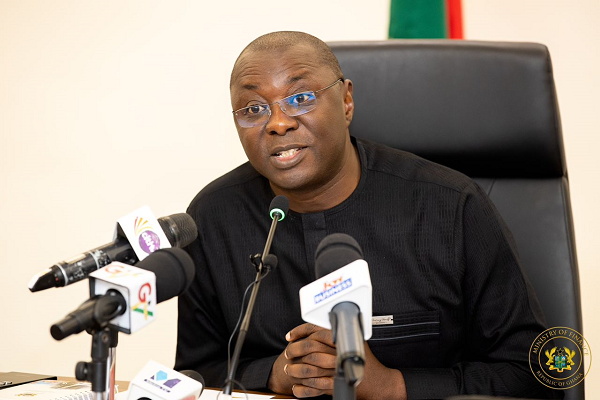
Economy stable, recovery kicks in - Finance Minister assures citizenry
The Minister of Finance, Dr Mohammed Amin Adam, has assured the public that the country’s macroeconomic environment continues to remain stable and signs of economic recovery are emerging.
That comes on the back of the government’s implementation of the International Monetary Fund (IMF)-supported Post COVID-19 Programme for Economic Growth (PC-PEG).
The Finance Minister said growth was proving to be more resilient and robust than initially programmed, characterised by declining inflation, a largely stabilised exchange rate, improved Gross International Reserves (GIR) position and a declining rate of accumulation of public debt after the debt restructuring exercise.
At the maiden Monthly Economic Update Series at the Ministry of Finance in Accra yesterday, Dr Adam said both the current account and trade balances continued to improve, with key structural reforms to support growth, improve revenue mobilisation and support sound monetary and exchange policy beginning to yield fruit.
“This economic performance we are witnessing has been achieved through the cooperation and sacrifice of all Ghanaians, and I take this opportunity to express the government’s appreciation for the immense support,” the Finance Minister stated.
Ghana’s economy has been faced with its toughest challenges in decades, characterised by high inflation which peaked at a 22-year high of 54.1 per cent in 2022, unstable currency, high interest rates, slow economic growth and an unsustainable public debt which surpassed 90 per cent of Gross Domestic Product (GDP) in 2022.
This prompted the government to formally seek help from the IMF, and after meeting all the prior actions and requirements, the Board of the IMF approved Ghana’s programme in May last year.
Ten months after implementing the programme, macroeconomic stability appears to be re-emerging.
Growth re-emerging
Latest figures from the Ghana Statistical Service (GSS) indicate that on a provisional basis, overall GDP for 2023 grew by 2.9 per cent, compared to a target of 2.3 per cent in the 2023 Mid-Year Review Budget.
Inflation also declined by 30.9 percentage points to 23.2 per cent in December 2023, before picking up slightly to 23.5 per cent in January 2024 and declining again to 23.2 per cent in February 2024.
The cedi also cumulatively depreciated against the United States dollar by 27.8 per cent at the end of December last year, down from the depreciation rate of 50 per cent at the end of November 2022.
For the first three months of the year, the cedi has depreciated by 6.8 per cent as of March 20, compared to 22.1 per cent recorded in the same period last year.
On the external side, the current account recorded a surplus of $0.46 billion at end of 2023 compared to a deficit of $1.52 billion at the end of Dec 2022.
The trade balance also ended 2023 at a surplus of $2.6 billion compared to a surplus of $2.9 billion at the end of 2022. The surplus trend continued in 2024 with a trade surplus of $392 million at the end of February 2024.
GIR, including encumbered assets and petroleum funds, stood at $5.9 billion (2.7 months of import cover) at the end of December 2023 from $6.3 billion (2.7 months import cover) at end December 2022.
The GIR improved to $6.2 billion at the end of February 2024 compared to $5.9 billion in 2022.
Monetary sector
On the monetary side, the Bank of Ghana (BoG) lowered the policy rate by 100 basis points to 29 per cent in January 2024 after consistently increasing it.
In response, although interest rates moderated from 35.5 per cent (91-day TB) in December 2022 to 19.7 per cent in April 2023, the rates increased to 29.36 per cent as of the end of December 2023.
Dr Amin said the first 12 auctions in 2024 had witnessed a consecutive decline in interest rates with the 91-Day Treasury Bill rate at 26 per cent as of last Monday.
On the fiscal side, public debt trajectory is improving as debt-to-GDP ratio reduced to 71.4 per cent of GDP at the end of 2023 from 73.5 per cent of GDP at the end of 2022.
The Finance Minister gave an assurance that the government was committed to staying the course of the IMF programme and building on the gains in spite of 2024 being an election year.
Growth strategy
Commenting on the way forward, Dr Adam said the government was putting in place measures to fast-track the implementation of the growth strategy with a key focus on small and medium enterprises (SME) development as a catalyst to support accelerated economic expansion in 2024 and the medium term.
SMEs currently account for 92 per cent of existing companies, 85 per cent of manufacturing jobs and 70 per cent of GDP.
Dr Amin said they, therefore, had a growth potential with possible significant impacts at the macroeconomic and sector levels.
He said preliminary consultations with stakeholders unearthed three main challenges for SMEs, namely access to finance, access to markets and exports, and tax constraints and formalisation.
“Government is determined to address, particularly, the financing challenges which have become very critical in SME development.
“This will ensure that we generate growth internally from SMEs underpinned by a robust SME financing ecosystem that can be leveraged as a vehicle for sustainable growth,” the Finance Minister stated.

